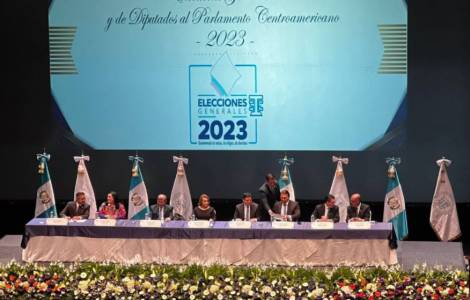
Celam
Guatemala City (Agenzia Fides) - The Bishops of Guatemala believe that "it is possible, as a people of faith and through the cooperation of all, to realize the desire for a better homeland, for a country that is more human, more fraternal and where it is possible to live in freedom, without fear and without the need to emigrate". This is what the bishops emphasize in a message published ahead of the parliamentary and presidential elections scheduled for June 25.
As "Guatemalan believers, pastors and citizens", the Bishops recall that the State has the duty to implement the Constitution of the Republic, "which begins by invoking God, reaffirms the value of the dignity of the human person, recognizes the family as responsible for the human and spiritual education of children holds the Government of Guatemala responsible for the promotion of the common good, the strengthening of legality, security, justice, liberty and peace".
That is why those who make politics "must primarily strive for the common good and not, as in many cases, pursue party or personal interests and their own enrichment". "Economic, social and political problems have not been resolved after almost forty years of democratic elections, largely because of this irresponsible attitude," the bishops lament.
The bishops also complained about irregularities in the registration of candidates for various offices and that "the way of electing deputies to the Congress of the Republic means that the Congress does not fulfill its function of representing and legislating in favor of the people". Previous complaints about the Parliament's ineffectiveness and poor performance had not been heard in the past.
The Supreme Electoral Court must always make its decisions "in compliance with the applicable electoral law and work independently, without allowing influence or complicity with the state authorities", so that the elections are credible. That is why the bishops consider it essential to press ahead with the "profound reform of the electoral law and of the political parties".
The bishops also appeal to candidates for mayor, particularly those seeking re-election, to be "transparent in their activities," not to accept suspicious funding, and not to use local and/or state funds to campaign.
Finally, they call on voters to fulfill their civic duty, to go to the polls, to avoid any form of violence and to accept the election results "in order to build a genuine and more solid democracy, thus demonstrating our Christian commitment and our love for Guatemala".
On June 25, Guatemalan voters will be asked, among other things, to elect a successor to President Alejandro Giammattei. Meanwhile, the Inter-American Commission on Human Rights (CIDH), which has been contacted by some opposition candidates who have been denied elections by the Supreme Electoral Court, issued a statement calling on the Guatemalan authorities to "respect political rights, pluralism and equal participation in the electoral process".
The citizens of the Latin American country will not only elect the President of the Republic, but also the members of Parliament and local governments. About thirty parties put up more than 20,000 candidates for the various offices.
The bishops, who "in spite of everything" believe in democracy as a system of government, have repeatedly pointed to the deterioration of democracy and the application of the law due to corruption. "It is possible, even in these circumstances, to promote an honest and transparent electoral process, so that both voters and candidates seek the common good" (see Fides, 28/1/2023). Other issues of concern, according to the bishops, are social degradation, violence against women, territorial conflicts, the situation of migrants and the consequences of the pandemic, which have exacerbated inequalities and injustices. (SL) (Agenzia Fides, 4/5/2023)